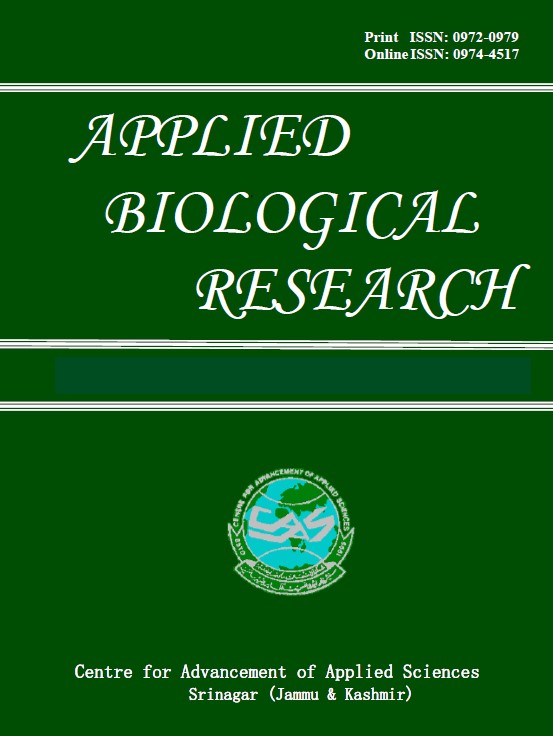IMPACT OF NUTRIENT-SPECIFIC MODULATION ON COLD STRESS TOLERANCE: INSIGHTS FROM Drosophila ananassae AND D. bipectinata
DOI:
https://doi.org/10.48165/abr.2024.26.01.31Keywords:
Cold tolerance, sucrose, survival frequency, tryptophan, wings deformationAbstract
Drosophila species (fruit flies) have long served as valuable model organisms in evolutionary research. Among the diverse traits exhibited by fruit flies, cold tolerance stands out as a critical factor influencing their ecological distribution and survival in varied environments. The majority of research on cold tolerance concentrates on subjecting flies to a single, stressful temperature without any modulation in the diet. The present study aimed to understand the impact of nutrient-specific modulation on the cold tolerance of Drosophila ananassae and D. bipectinata across a broad range of lower temperatures. Adult flies were transferred to the media composition enriched with sucrose and tryptophan in three replicates and maintained at 22oC. 20 flies of a particular stage: adults, eggs, larvae and pupa were exposed to 18oC, 14oC, and 10oC for 5 days. The impact of cold stress on their growth and survival was noted for 5 following days. The impact of dietary modifications on cold stress tolerance and life history traits was positive and consistent across both species. In contrast, D. bipectinata had greater survival rates than D. ananassae across all temperatures and dietary regimes. Tryptophan (100 mg) diet performed best to improve life traits on cold stress treatment.
Downloads
References
Aggarwal, D.D., Mishra, P. and Singh, M. 2023. An analysis of direct and indirect effects in Drosophila melanogaster undergoing a few cycles of experimental evolution for stress-related traits. Comparative Biochemistry and Physiology Part B: Biochemistry and Molecular Biology, 263: p.110795. [https://doi.org/10.1016/j.cbpb.2022.110795].
Andersen, J.L., Manenti, T., Sørensen, J.G., MacMillan, H.A., Loeschcke, V. and Overgaard, J. 2015.
Nishkala G. Appaji and B. P. Harin
How to assess Drosophila cold tolerance: Chill coma temperature and lower lethal temperature are the best predictors of cold distribution limits. Functional Ecology, 29: 55-65. Bayliak, M.M., Lylyk. M.P., Maniukh, O.V., Storey, J.M., Storey, K.B. and Lushchak, V.I. 2018. Dietary L-arginine accelerates pupation and promotes high protein levels but induces oxidative stress and reduces fecundity and life span in Drosophila melanogaster. Journal of Comparative Physiology B, 188(1): 37-55.
De Ro, M., Enriquez, T., Bonte, J., Ebrahimi, N., Casteels, H., De Clercq, P. and Colinet, H. 2021. Effect of starvation on the cold tolerance of adult Drosophila suzukii (Diptera: Drosophilidae). Bulletin of Entomological Research, 111(6): 694-704.
Enriquez, T. and Colinet, H. 2019. Cold acclimation triggers major transcriptional changes in Drosophila suzukii. BMC Genomics, 20(1): 1-17.
Freda, P.J., Alex, J.T., Morgan, T.J. and Ragland, G.J. 2017. Genetic decoupling of thermal hardiness across metamorphosis in Drosophila melanogaster. Integrative and Comparative Biology, 57: 999-1009.
Garcia, M.J., Littler, A.S., Sriram, A. and Teets, N.M. 2020. Distinct cold tolerance traits independently vary across genotypes in Drosophila melanogaster. Evolution, 74(7): 1437-1450. Henry, Y., Overgaard, J. and Colinet, H. 2020. Dietary nutrient balance shapes phenotypic traits of Drosophila melanogaster in interaction with gut microbiota. Comparative Biochemistry and Physiology Part A: Molecular & Integrative Physiology, 241: 110626 [https://doi.org/ 10.1016/j.cbpa.2019.110626].
Hoffmann, A.A. 2010. Physiological climatic limits in Drosophila: Patterns and implications. Journal of Experimental Biology, 213: 870-880.
Hurza, V., Butenko, N., Demianchuk, O., Balatskiy, V., Derkachov, V. and Lylyk, M. 2022. High consumption of Lard and fructose modulates larval pupation and stress resistance in Drosophila melanogaster adults. Journal of Vasyl Stefanyk Precarpathian National University, 9(4): 42-55.
Koštál, V., Grgac, R. and Korbelová, J. 2019. Delayed mortality and sublethal effects of cold stress in Drosophila melanogaster. Journal of Insect Physiology, 113: 24-32.
Koštál, V., Korbelová, J., Poupardin, R., Moos, M. and Šimek, P. 2016. Arginine and proline applied as food additives stimulate high freeze tolerance in larvae of Drosophila melanogaster. Journal of Experimental Biology, 219(15): 2358-2367.
MacMillan, H., Knee, J., Dennis, A. Udaka, H., Marshall, K.E., Merritt, T.J.S. and Sinclair, B.J. 2016. Cold acclimation wholly reorganizes the Drosophila melanogaster transcriptome and meta bolome. Scientific Reports, 6: 28999. [https://doi.org/10.1038/srep28999].
Malkeyeva, D., Kiseleva, E. and Fedorova, S. 2020. Small heat shock protein Hsp67Bc plays a significant role in Drosophila melanogaster cold stress tolerance. Journal of Experimental Biology, 223(21): p.jeb219592. [https://doi.org/10.1242/jeb.219592].
Overgaard, J. and MacMillan, H.A. 2017. The integrative physiology of insect chill tolerance. Annual Review of Physiology, 79: 187-208.
Signor, S., Seher, T. and Kopp, A. 2013. Genomic resources for multiple species in the Drosophila ananassae species group. Fly (Austin), 7(1): 47-57. [https://doi.org/10.4161/fly.22353]. Staats, S., Wagner, A.E., Kowalewski, B., Rieck, F.T., Soukup, S.T., Kulling, S.E. and Rimbach, G. 2018. Dietary resveratrol does not affect life span, body composition, stress response, and longevity-related gene expression in Drosophila melanogaster. International Journal of Molecular Sciences 19(1): 223 [https://doi.org/10.3390/ijms19010223].
Strilbytska, O., Strutynska, T., Semaniuk, U., Burdyliyk, N., Bubalo, V. and Lushchak, O. 2022. Dietary sucrose determines stress resistance, oxidative damages, and antioxidant defense system in Drosophila. Scientifica. 2: 2022: 7262342. [https://doi.org/10.1155/2022/7262342].
Tarapacki, P., Jørgensen, L.B., Sørensen, J.G., Andersen, M.K., Colinet, H. and Overgaard, J. 2021. Acclimation, duration and intensity of cold exposure determine the rate of cold stress accumulation and mortality in Drosophila suzukii. Journal of Insect Physiology, 135: 104323. [https://doi.org/10.1016/j.jinsphys.2021.104323].

